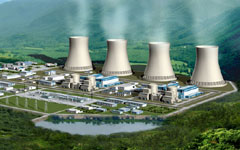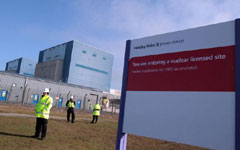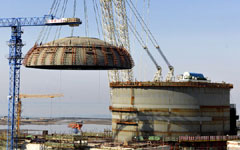China to accelerate nuclear power development
Updated: 2014-06-17 11:02
(Xinhua)
|
|||||||||||
BEIJING - China still relies too heavily on coal for power, with nuclear power seen as the route to an optimized energy structure and cleaner growth.
In a meeting of the Central Leading Group for Financial and Economic Affairs on Friday, President Xi Jinping said clean and efficient use of coal and development of other energy sources were crucial to development plans. An energy supply system should be driven diversely by coal, oil, gas, nuclear, new energy and renewable resources, he said.
"By adopting top international standards and ensuring safety, China should lose no time in constructing nuclear power projects in eastern coastal regions," he said.
 |
 |
 |
The need to conserve energy, reduce emissions and steer away from reliance on coal -- the dirtiest form of energy -- has never been more obvious.
China aims to reduce energy consumption per unit of GDP by 16 percent from the 2010 level by 2015. The indicator dropped 9.03 percent from 2011 to 2013, accounting for only 54 percent of the overall target.
"In reality, the development of nuclear power is all about substituting coal," said Liu Qiang, an energy expert with the Chinese Academy of Social Sciences.
Considering the economic realities, nuclear power is not likely to face great opposition, Liu said.
Since the Fukushima nuclear disaster in 2011, China has reinforced safety at all nuclear plants. Plans for nuclear power safety and long-term development of nuclear power were passed in 2012, with approval planned for only a few projects in coastal areas before 2015, and none in inland regions.
By the end of last year, 17 nuclear plants were in operation, with a total capacity of nearly 15,000 megawatts of electricity.
At a meeting of the National Energy Commission on April 18, Premier Li Keqiang announced the introduction of new nuclear power plants along the east coast "at a proper time".
Earlier this month, the Ministry of Environmental Protection released the environmental impact statements for two new nuclear power plants, one in Guangdong province and another in Shandong, but this is still not enough in the longer term.
"China's nuclear power sector still has a long way to go before reaching the global average," said Ye Qizhen of the Chinese Academy of Engineering.
A proportion of 10 percent of nuclear power is an ideal number for China, Ye said.
Related Stories
China, Italy in nuclear power cooperation 2014-06-12 14:15
China schedules new nuclear power reactors 2014-05-29 21:51
China National Nuclear Power plans $2.6b share sale in IPO 2014-05-05 16:01
Chinese, Romanian firms to extend nuclear power co-op 2014-04-26 16:37
Two nuclear firms seek to invest in new UK reactors 2014-04-18 07:21
China builds up nuclear power grid 2014-04-16 07:06
Today's Top News
Li's Britain journey 'to help build trust'
Income disparity hurting Asia
US should 'attune itself' to China
Attackers seized in Xinjiang
49 killed as transport plane downed in Ukraine
China finds way to play in 2014 World Cup
Protocol targets sex violence
Premier all business on Europe trip
Hot Topics
Lunar probe , China growth forecasts, Emission rules get tougher, China seen through 'colored lens', International board,
Editor's Picks

|

|

|

|

|

|





